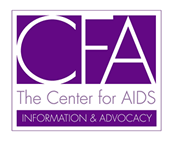
Thomas Gegeny is the Executive Director and Senior Editor for the Center for Aids in Houston, Texas.
Visit the Center’s site at: www.centerforaids.org
UPDATE: Mr. Gegeny just sent the following message:
“Wejust published a series of essays that I think the students might find particularly enlightening re: the epidemic in the US. It’s on our website, www.centerforaids.org/rita. The fall 2005 issue (PDF files).”
Mr. Gegeny’s bio (from the CFA website): Tom joined The CFA in January 2000 as Editor of the journal Research Initiative/Treatment Action! (RITA!) and the RITA! Weekly Newsletter. As Senior Editor, he is responsible for editing, writing for, and overseeing the planning and production of these publications, as well as the patient newsletter HIV Treatment ALERTS! Tom also develops and maintains The CFA’s website and online publications. In June 2003, Tom was appointed Executive Director of The CFA by the organization’s Board of Directors. He is responsible for overseeing all programs of The CFA, as well as supervising its administration and development activities.
Before joining The CFA, Tom was employed as the Publications Specialist for the Houston Academy of Medicine–Texas Medical Center Library, where he was responsible for the creation and operation of the library’s Publications Services program. Tom earned a Bachelor of Science degree in Biology from Fairfield University (Fairfield, CT) in 1994, with a second major in Studio Art and minors in Psychology and Philosophy. In 1997, he completed a Master of Science degree in Biomedical Sciences at The University of Texas Houston Health Science Center. In May 2000, he completed an Associate of Applied Science degree in Technical Communication at Houston Community College, where he also earned a Certificate in Web Production in December 2002.
Tom earned certification as an Editor in the Life Sciences (ELS) from the Board of Editors in the Life Sciences in November 1999. He is a Past President of the Southwest Chapter of the American Medical Writers Association (AMWA) and has served as Administrator of Publications and Administrator of Membership for AMWA nationally. Currently, he is the Administrator of the 2005 Annual Conference for AMWA. In October 2004, he was named an AMWA Fellow.
In February 2004, Tom was elected to the national Steering Committee for the AIDS Treatment Activists Coalition (ATAC), for which he served as that committee’s President from 2004 to 2005. Currently, Tom serves as Co-Chair for the Drug Development Committee (DDC) of ATAC and helps coordinate activities of ATAC’s Media and Communications Resource Committee.
Using the information above as well as your own interests and further research, compose appropriate, relevant questions to ask Mr. Gegeny when he visits us on December 22nd. Questions should be conceptual, in-depth, and original (do not repeat other students’ questions). Post them here so we can share our ideas and thoughts.
Our interview will conclude with the “Big10.” . . . a series of rapid-fire, quick-response questions based on The Pivot Questionnaire. You will probably recognize them as similar to the 10 questions James Lipton asks of his interviewees on the television program Inside the Actor’s Studio.
01. What is your favorite word?
02. What is your least favorite word?
03. What gets your creative juices flowing
04. Who has made the biggest impact on your life? (name and relation)
05. What is your favorite scientific word?
06. What sound or noise do you love?
07. What sound or noise do you hate?
08. What profession other than your own would you like to attempt?
09. What profession would you not like to do?
10. What phrase or message should all people know?
Posted in Uncategorized | |
 rse is to attend a fair or symposium where you share your ideas. You take a risk, and hopefully rise to the challenge. Over the next weeks we will be attending different events. Provide a reflection of your experience. What were the challenges? The rewards? What was the best part? The worst? What surprised you? What advice would you give to others who would follow in your footsteps? Have you been inspired in any way?
rse is to attend a fair or symposium where you share your ideas. You take a risk, and hopefully rise to the challenge. Over the next weeks we will be attending different events. Provide a reflection of your experience. What were the challenges? The rewards? What was the best part? The worst? What surprised you? What advice would you give to others who would follow in your footsteps? Have you been inspired in any way?









